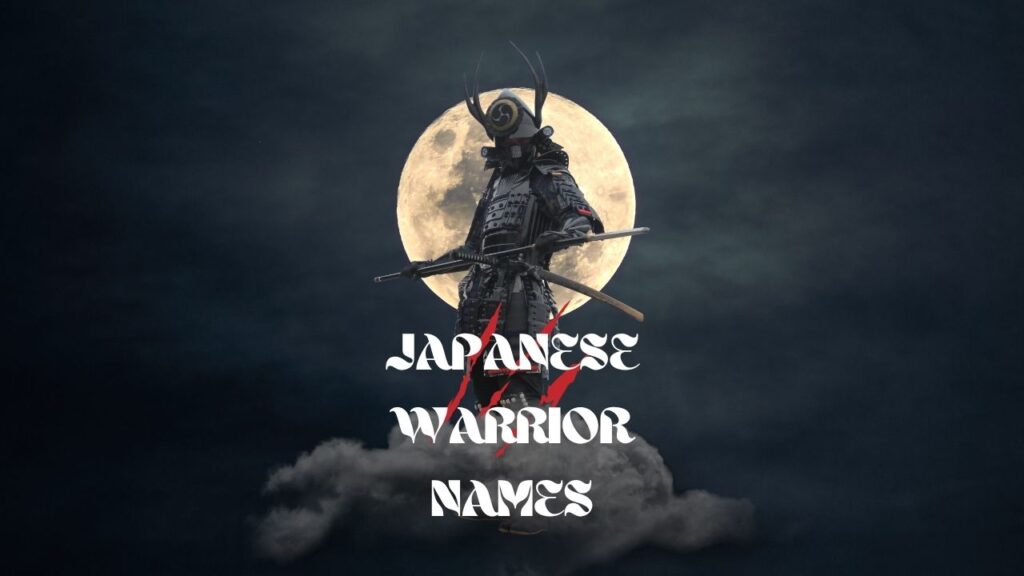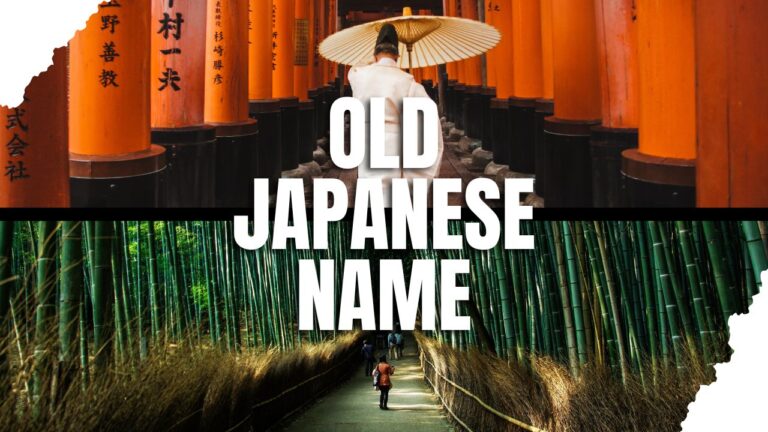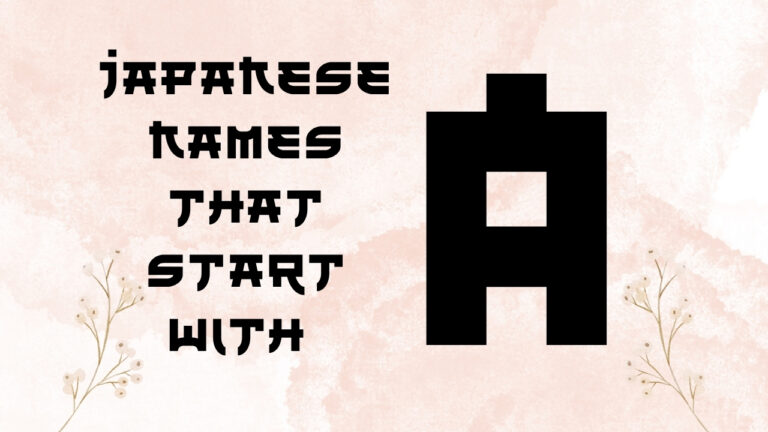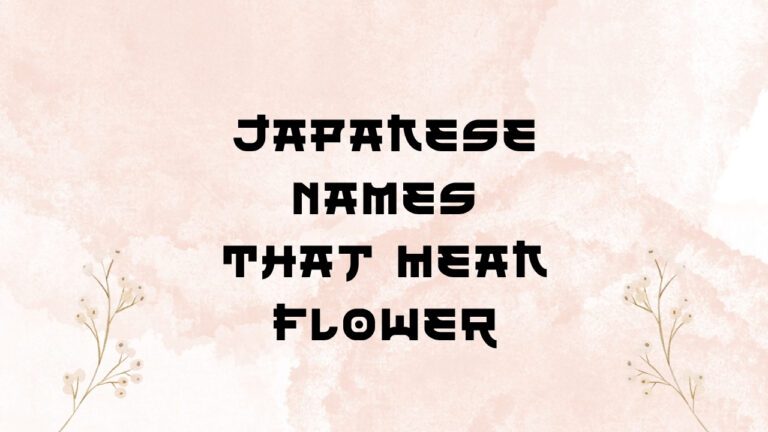120+ Japanese Warrior Names: Male, Female, Historical & Anime
Japan’s rich and ancient history, warriors have played a powerful role in shaping the nation’s culture, legacy, and stories. From fearless samurai to iconic battle heroes, Japanese warrior names carry deep meanings and reflect traits like honor, courage, and strength.
In this article, we’ll explore a wide range of names—from traditional Japanese warrior names male and female, to cool samurai names that echo the valor of the past. Whether you’re looking for historical inspiration or naming ideas rooted in warrior spirit, these names offer insight into both personality and heritage.
You’ll also discover Japanese warrior names and meanings that connect to legendary figures and tales of bravery, including the story of a legendary warrior in Japanese history.
Also Read:100+ Japanese Demon Names: Oni, Yokai & Evil Spirits

Unisex Japanese Warrior Names
- Haruki (陽輝) – Radiant Sun
A bright and strong name, symbolizing hope and warrior’s light. - Ren (蓮) – Lotus
Represents purity and resilience, a peaceful warrior’s spirit. - Makoto (誠) – Truth / Sincerity
Honesty is a key trait of a noble warrior; gender-neutral and respectful. - Kaoru (薫) – Fragrance
Traditionally used for both genders, it implies a gentle but powerful presence. - Hikaru (光) – Light
A name symbolizing enlightenment and clarity in battle. - Sora (空) – Sky
Warriors who rise above, with vision and freedom. - Nao (直) – Honest / Straightforward
Known for representing moral clarity and integrity in the warrior’s path. - Rei (礼) – Respect / Courtesy
Deeply tied to Bushido – the way of the warrior – emphasizing honor and manners. - Aoi (葵) – Hollyhock / Blue
A peaceful yet resilient name often given to warriors with calm strength. - Kou (光 / 幸) – Light / Happiness
Reflects inner strength and bright destiny. - Tomo (智 / 友) – Wisdom / Friend
Signifies loyalty and intelligence, valued by all legendary warriors. - Minato (湊) – Harbor / Port
Symbolizes safety and defense, like a warrior guarding a stronghold. - Yuu (優 / 勇) – Gentle / Brave
Used for both genders, often with different kanji. Signifies balanced strength. - Asahi (朝日) – Morning Sun
Represents a new beginning and rising courage. - Riku (陸) – Land
Grounded and stable, symbolizing a reliable and strong warrior. - Akira (明 / 晶) – Bright / Clear
A name used across genders, representing mental clarity and brilliance in strategy. - Michiru (満 / みちる) – Full / Complete
A name for those who fulfill their warrior path with completeness. - Sei (星 / 静) – Star / Silent
Quiet strength, a warrior who leads without chaos. - Shin (信 / 真) – Faith / Truth
Known among warriors for steadfastness and deep loyalty. - Kairi (海里) – Ocean Village
A modern but powerful name associated with wide-reaching strength. - Hinata (日向) – Sunny Place
Bright and positive, used for those with a warm yet fierce nature. - Izumi (泉) – Spring (water)
Life-giving and renewing energy, ideal for peaceful yet powerful fighters. - Misaki (美咲) – Beautiful Blossom
Although soft-sounding, it reflects growth through struggle—true warrior essence. - Tsubasa (翼) – Wings
Freedom and strength, soaring above with warrior will. - Yuuki (勇気) – Courage
A direct nod to bravery, one of the core traits of any legendary warrior in Japanese tradition.
Male Japanese Warrior Names
- Takeshi (武) – Warrior / Military
A classic name meaning “fierce warrior,” widely used for strong male figures. - Masaru (勝) – Victory
Signifies triumph and success in battle; perfect for a born fighter. - Kenshin (剣心) – Sword Heart
Represents a warrior who fights with honor and a strong moral code. - Ryouma (龍馬) – Dragon Horse
A powerful and fast name; evokes the strength of a dragon and speed of a horse. - Hayato (隼人) – Falcon Person
Symbolizes sharpness, agility, and speed on the battlefield. - Shigeru (茂) – Luxuriant / Strong Growth
Represents endurance and the ability to grow strong under pressure. - Tadashi (正) – Loyal / Righteous
A name tied to discipline and the Bushido principle of justice. - Kentarou (健太郎) – Healthy, Strong Boy
Denotes physical power and resilience, often given to future protectors. - Genzou (源三) – Original Ancestor / Source Three
A name that carries old warrior lineage and noble beginnings. - Hiroshi (浩 / 寛) – Generous / Vast
Reflects a calm yet commanding warrior presence. - Daichi (大地) – Great Earth
Symbolizes a grounded and solid warrior with unwavering stability. - Masaki (正樹) – Righteous Tree
A name showing moral strength and deep roots in honor. - Takahiro (貴弘) – Noble and Expansive
Suggests nobility of spirit and a warrior destined for greatness. - Shougo (翔吾) – Fly / Protect
Combines movement and defense — a soaring yet safeguarding presence. - Manabu (学) – Learn / Study
Signifies a strategic warrior who grows wiser through discipline. - Kazuya (一也) – Harmonious One
A balanced warrior, known for unity and calm strength in chaos. - Noboru (昇) – Rise / Ascend
Ideal for a warrior who overcomes adversity and rises through ranks. - Tetsuya (哲也) – Iron / Wisdom
A mix of mental strength and toughness, essential for war leadership. - Masanori (正則) – Righteous Law
Reflects justice and order, crucial for a samurai’s code. - Yamato (大和) – Great Harmony
Deeply tied to Japan’s identity; evokes pride, unity, and heritage. - Rentarou (蓮太郎) – Lotus Boy
Combines purity with strength — a noble soul who fights for peace. - Seiji (誠司) – Sincere Ruler
Represents an honest warrior leader guided by truth. - Katsuya (勝也) – Victory and Bravery
A bold and commanding name, destined for one who never backs down. - Naoto (直人) – Honest Man
Used for warriors who lead with integrity and transparency. - Jirou (次郎) – Second Son / Warrior’s Heir
A traditional name for younger sons in samurai families.
Female Japanese Warrior Names
- Ayaka (彩華) – Colorful Flower
A graceful name symbolizing both beauty and inner strength. - Tomoe (巴) – Circle / Turning
Linked to Tomoe Gozen, a famous female samurai; a symbol of power and loyalty. - Sayuri (小百合) – Little Lily
Gentle yet strong, often given to women with quiet determination. - Misao (操) – Chastity / Honor
Represents loyalty and integrity, traits prized in female warriors. - Yuriko (百合子) – Lily Child
Elegant and refined, yet symbolizes bravery beneath grace. - Kikyo (桔梗) – Bellflower
A poetic name also associated with undying loyalty in war legends. - Chiharu (千春) – Thousand Springs
Suggests renewal and enduring spirit, fitting for resilient fighters. - Fuyumi (冬美) – Winter Beauty
Cool and composed—ideal for a strategic and calm warrior. - Emiko (恵美子) – Blessed Beautiful Child
Represents those who fight for protection and care of others. - Reika (麗華) – Graceful Flower
A soft appearance with a warrior’s willpower within. - Yumi (由美) – Reason and Beauty
Practical and strong-minded, used by strong-willed women. - Suzu (鈴) – Bell
Light-sounding but sharp—like a bell that alerts danger or courage. - Hotaru (蛍) – Firefly
Small and glowing, representing silent strength and focus. - Nadeshiko (撫子) – Pink Carnation / Ideal Woman
A traditional name for women who balance beauty and bravery. - Kanae (奏恵) – Play Harmony / Blessing
Used for warriors who seek balance between battle and peace. - Minami (南) – South
A directional name symbolizing guidance and warmth on the battlefield. - Tsukiko (月子) – Moon Child
Silent, strategic, and wise—like the moon over the night of war. - Atsuko (篤子) – Sincere Child
Reflects deep dedication and an unwavering spirit. - Keiko (恵子) – Blessed Child
A humble yet respected name, often tied to nurturing warriors. - Rina (里奈) – Village Greens
Tied to defenders of home and heritage. - Hisako (久子) – Eternal Child
Symbolizing a lasting presence and long-standing loyalty. - Mai (舞) – Dance
Represents grace in movement, important in martial arts. - Kazue (和恵) – Harmony and Blessing
Tied to warriors who brought unity and healing after battle. - Sanae (早苗) – Early Seedling
Fresh, energetic, and full of potential—perfect for young fighters. - Nozomi (望) – Hope / Wish
A powerful name reflecting the dreams and drive behind every battle.
Historical Japanese Warrior Names
- Yoshitsune (義経) – Righteous Economics
Minamoto no Yoshitsune, a brilliant and tragic general from the Genpei War known for his unmatched tactics. - Kenshin (謙信) – Modest Faith
Uesugi Kenshin, known as the “Dragon of Echigo,” a famous daimyo and rival of Takeda Shingen. - Shingen (信玄) – Faithful Illusion
Takeda Shingen, a powerful and respected warlord known for his military prowess and wisdom. - Ieyasu (家康) – Peaceful Home
Tokugawa Ieyasu, the founder of the Tokugawa shogunate that ruled Japan for over 250 years. - Nobunaga (信長) – Trust and Authority
Oda Nobunaga, a revolutionary daimyo who unified much of Japan before being betrayed. - Hideyoshi (秀吉) – Excellent Goodness
Toyotomi Hideyoshi, a brilliant strategist and leader who rose from peasantry to rule all Japan. - Masamune (政宗) – Correct Religion
Date Masamune, the “One-Eyed Dragon,” known for his fierce leadership and cultural achievements. - Kano (加納) – Add Ability
Kano Motonobu, a warrior-artist influential in samurai culture. - Sakamoto (坂本) – Slope Origin
Sakamoto Ryōma, a key figure in overthrowing the Tokugawa shogunate and modernizing Japan. - Naotora (直虎) – Honest Tiger
Ii Naotora, a rare female daimyo who led her clan during the Warring States period. - Tadakatsu (忠勝) – Loyal Victory
Honda Tadakatsu, known as Tokugawa Ieyasu’s invincible general, often called “the warrior who never bled.” - Yukimura (幸村) – Lucky Village
Sanada Yukimura, hailed as the “crimson demon of war,” he was a tactical genius and fan-favorite samurai. - Tomoe (巴御前) – Turning / Lady Tomoe
Tomoe Gozen, a legendary female samurai celebrated for her beauty and battle skills. - Mochizuki (望月) – Full Moon
Mochizuki Chiyome, reputed founder of a female ninja school. - Katsuie (勝家) – Victory House
Shibata Katsuie, a brave general under Nobunaga with a tragic ending. - Kanetsugu (兼続) – Unifying Continuity
Naoe Kanetsugu, known for his loyalty and wearing the kanji “愛” (Love) on his helmet. - Toshizo (歳三) – Long Life Three
Hijikata Toshizō, vice-commander of the Shinsengumi and a symbol of samurai honor. - Kondo (近藤) – Near Wisteria
Kondō Isami, leader of the Shinsengumi, remembered for his strict code and sacrifice. - Okita (沖田) – Outer Rice Field
Okita Sōji, a young but deadly swordsman of the Shinsengumi. - Kojirō (小次郎) – Small Second Son
Sasaki Kojirō, the famed swordsman who dueled Miyamoto Musashi. - Musashi (武蔵) – Warrior Storehouse
Miyamoto Musashi, Japan’s most famous swordsman and author of The Book of Five Rings. - Ginchiyo (誾千代) – Quiet Wisdom Thousand Generations
Tachibana Ginchiyo, a respected female warrior and daughter of a samurai clan lord. - Kaihime (甲斐姫) – Kai Princess
Known for defending her castle against the Toyotomi army during the Sengoku period. - Yoritomo (頼朝) – Dependable Morning
Minamoto no Yoritomo, the first shogun of the Kamakura shogunate. - Hidemasa (秀政) – Outstanding Governance
Gamo Hidemasa, a loyal general who fought for Hideyoshi and died heroically in battle.
Legendary Japanese Warrior Names
- Raikō (頼光) – Trust and Light
Also known as Minamoto no Yorimitsu, a legendary demon-slaying general during the Heian period. - Kintarō (金太郎) – Golden Boy
A super-strong child hero raised by a mountain witch, later becoming a loyal warrior. - Ushiwakamaru (牛若丸) – Young Bull Boy
The childhood name of Yoshitsune; legendary for agility and swordsmanship. - Jiraiya (自来也) – Young Thunder
A mythical ninja who uses toad magic; symbol of courage and cleverness. - Sarutobi Sasuke (猿飛佐助) – Monkey-Leap Sasuke
A legendary ninja known for incredible speed and agility; inspired many modern ninja tales. - Fudō Myōō (不動明王) – Immovable Wisdom King
A fierce guardian deity of warriors, often depicted with a sword and flames. - Benkei (弁慶) – Eloquent Celebration
A giant warrior monk loyal to Yoshitsune; famed for his unmatched strength and loyalty. - Hōjō Tokimune (北条時宗) – Northern Castle Time Religion
Led Japan against the Mongol invasions; known as a spiritual and military leader. - Taira no Masakado (平将門) – Peaceful Commander
A rebel warrior who became a powerful folk hero and even a deified spirit in Tokyo. - Ibaraki-dōji (茨木童子) – Thorny Tree Child
A fearsome oni (demon) warrior, often depicted in battles with Raikō. - Yamato Takeru (日本武尊) – Brave of Yamato
A semi-mythical prince and warrior, known for dressing as a maid to assassinate an enemy warlord. - Shuten-dōji (酒呑童子) – Sake-Drinking Boy
A legendary demon leader slain by Minamoto no Raikō; symbol of evil power in battle. - Hachiman Tarō Yoshiie (八幡太郎義家) – God of War’s Eldest Son
A real and semi-legendary warrior venerated as the embodiment of samurai values. - Tennin (天人) – Heavenly Being
Though not a single warrior, these celestial beings were believed to grant strength to heroes. - Tametomo (為朝) – For the Morning
Minamoto no Tametomo, famed for superhuman archery skills and allegedly sinking a ship with one arrow. - Nasu no Yoichi (那須与一) – Bestowed One of Nasu
A legendary archer who hit a fan target on a moving boat during the Genpei War. - Yagyū Muneyoshi (柳生宗厳) – Willow Birth, Strict Religion
Founder of Yagyū Shinkage-ryū, one of the most respected swordsmanship schools. - Kusunoki Masashige (楠木正成) – True Tree of Justice
A symbol of loyalty and strategic brilliance during the fall of the Kamakura shogunate. - Oniwakamaru (鬼若丸) – Young Demon Boy
The youthful name of Benkei in folklore, raised in temples and known for his strength. - Jingū Kōgō (神功皇后) – Empress of Divine Work
A semi-legendary empress who led warriors and invaded Korea according to myth. - Hōzōin In’ei (宝蔵院胤栄) – Treasure Storehouse, Inheriting Glory
A famous warrior monk and spear master whose techniques are still practiced today. - Kōga Gennosuke (甲賀弦之介) – Kōga Bowstring Helper
A fictionalized but legendary ninja figure, often associated with honor and stealth. - Iga Jūbei (伊賀十兵衛) – Ten Warriors of Iga
A stylized name for a legendary Iga ninja, often reimagined in drama and film. - Tsuchigumo (土蜘蛛) – Earth Spider
Mythical warrior-yōkai defeated by Raikō; symbolizes hidden danger and strength. - Amakusa Shirō (天草四郎) – Fourth Son of Heaven’s Grassland
A young Christian warrior who led a major rebellion and became a martyr-like figure in Japanese folklore.
Anime Japanese Warrior Names
- Guts (ガッツ) – Grit / Determination
From Berserk. A fierce swordsman with unmatched strength and a tragic past. - Kenshiro (ケンシロウ) – Sword Castle
From Fist of the North Star. A post-apocalyptic martial arts master of Hokuto Shinken. - Roronoa Zoro (ロロノア・ゾロ)
From One Piece. A three-sword style swordsman; name inspired by real pirate François l’Olonnais. - Kiryuuin Satsuki (鬼龍院 皐月) – Demon Dragon Institution / May Moon
From Kill la Kill. A fearless and commanding warrior woman. - Erza Scarlet (エルザ・スカーレット)
From Fairy Tail. A knight mage known for her “Requip” armor magic and strict sense of justice. - Kiryuu Kazuma (桐生 一馬) – Paulownia Dragon / First Horse
From Yakuza anime and games. Though not a samurai, a modern-day warrior with fierce code of honor. - Kamina (カミナ) – Divine Name (Phonetic)
From Tengen Toppa Gurren Lagann. A passionate leader who fights with belief and pride. - Levi Ackerman (リヴァイ・アッカーマン)
From Attack on Titan. A precise and deadly warrior, regarded as humanity’s strongest soldier. - Saber / Artoria Pendragon (セイバー / アルトリア・ペンドラゴン)
From Fate/stay night. A legendary knight reimagined as a dignified female warrior. - Sesshōmaru (殺生丸) – Killing Life Circle
From Inuyasha. A cold yet elegant yokai warrior with a strong moral code. - Byakuya Kuchiki (朽木 白哉) – Withered Tree / White Figure
From Bleach. A noble soul reaper with swordsmanship rooted in calm precision. - Kenshin Himura (緋村 剣心) – Scarlet Village Sword Heart
From Rurouni Kenshin. A repentant swordsman known as Battousai the Manslayer. - Toguro (戸愚呂) – Door Wrath
From Yu Yu Hakusho. A brutal demon fighter with overwhelming strength. - Ichigo Kurosaki (黒崎 一護) – Black Cape / One Protector
From Bleach. A hybrid warrior with powers of soul reaper, hollow, and Quincy. - Sasuke Uchiha (うちは サスケ) – Fan / Help
From Naruto. A revenge-driven shinobi with incredible combat abilities. - Gojou Satoru (五条 悟) – Five Stripes / Enlightenment
From Jujutsu Kaisen. The strongest jujutsu sorcerer with limitless powers and sharp wit. - Mugen (無限) – Infinity
From Samurai Champloo. A wild, freestyle swordsman with no formal training but deadly skills. - Jin (仁) – Benevolence
From Samurai Champloo. A calm, traditional ronin who represents balance and honor. - Akame (アカメ) – Red Eye
From Akame ga Kill!. A deadly assassin and sword user with silent strength. - Gojou Kazuya (五条 一也) – Five Stripes / One Peaceful
From My Dress-Up Darling. While not a warrior literally, the name resonates with traditional themes. - Gilgamesh (ギルガメッシュ)
From Fate series. A mythic king with a warrior’s pride and treasury of godlike weapons. - Shinya Kogami (狡噛 慎也) – Cunning Bite / Cautious One
From Psycho-Pass. A modern “law enforcer” who acts like a digital-age samurai. - Yato (夜ト) – Night Door
From Noragami. A god of calamity trying to reform, fights with a divine blade. - Sango (珊瑚) – Coral
From Inuyasha. A demon slayer trained from childhood; skilled and courageous. - Ryuko Matoi (纏 流子) – Wrap / Flowing Child
From Kill la Kill. A fierce, revenge-driven warrior girl wielding a half-scissor blade.
conclusion
Japanese warrior names carry a deep legacy rooted in history, legend, and modern storytelling. Whether drawn from real samurai, mythical heroes, or anime icons, each name reflects a unique spirit—honor, strength, resilience, or strategy.
These names offers more than just inspiration; it opens a window into the values and traditions that shaped Japanese culture across centuries. Whether you’re looking for a meaningful name or simply curious about their origins, these warrior names remind us of the enduring power of courage and character.






